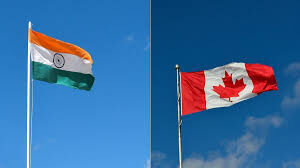Sikh Activists Rally at Golden Temple, Demanding Justice for Slain Separatist as Canada-India Tensions Escalate
Sikh activists unite outside the Golden Temple demanding justice for the killers of Hardeep Singh Nijjar, reigniting tensions between Canada and India with allegations of government involvement.
In a powerful display of unity and protest, hundreds of Sikh activists gathered outside the Golden Temple in Amritsar to demand justice for the killers of Sikh separatist Hardeep Singh Nijjar, who was shot dead in Canada. This incident, which took place in July, has reignited tensions between Canada and India, with Canadian Prime Minister Justin Trudeau suggesting a possible link between the Indian government and the murder.
Nijjar, who had been declared a terror suspect by India in 2020, left India years ago following the death of his father, who was also a Sikh separatist leader. The Sikh community in Canada has a significant presence, and Trudeau's remarks about the potential involvement of the Indian government have triggered a stern response from India.
In response to the allegations made by Canada, India temporarily suspended visa processing for Canadians and issued travel warnings for Indians in Canada or those planning a trip there. Both countries also expelled a diplomat in a diplomatic tit-for-tat.
🙄🤔🧐
— Bhavika Kapoor ✋ (@BhavikaKapoor5) September 29, 2023
⚡Sikh group protests outside Golden Temple in India over killing in Canada
▪️Hundreds of Sikh activists on Friday staged a demonstration outside the Golden Temple in Amritsar, demanding punishment for the killers of a Sikh separatist in Canada.
https://t.co/UWH30egRsV
However, Canada has not provided any evidence to support its suspicions, although Trudeau defended his government's decision to make the suspicions public. The protesters at the Golden Temple called on the Indian government to halt extrajudicial operations against separatists seeking an independent state in Punjab or a part of the majority-Sikh region that spans India's border with Pakistan.
Sikhism is the country's fourth most prevalent religion after Hinduism, Islam, and Christianity, and Sikhs constitute a majority of the population in the Punjab area of northern India and southern Pakistan. Some Sikh activists advocate for the creation of Khalistan, an independent nation on this territory.
The protests shine a spotlight on an often overlooked issue that has gained renewed international attention in the wake of Nijjar's death. Paramjit Singh Mand, a leader of the Dal Khalsa group advocating for a separate Sikh homeland, emphasized the importance of dialogue between New Delhi and Sikh leadership to address these longstanding grievances.
While the protests took place in Amritsar, Indian Foreign Minister Subrahmanyam Jaishankar was in Washington D.C., where he discussed the issue with US State Secretary Anthony Blinken and US National Security Advisor Jake Sullivan. Jaishankar highlighted the concerns of the Indian government and raised the issue of Canada's permissive attitude towards terrorists, extremists, and individuals advocating violence.
Although the US State Department's official statement on the visit did not mention this specific issue, a US official confirmed that Blinken had discussed the matter with Jaishankar and urged India to cooperate with Canada's investigation. The Sikh activists at the Golden Temple expressed gratitude towards the Canadian government for exposing the alleged Indian intervention in Canadian affairs.
Kanwar Pal, the political affairs secretary of the group, thanked Canada for shedding light on India's activities on foreign soil. This issue has posed a significant challenge to India's relations with Canada over the years and has created friction due to what India considers a lenient approach by Canada towards terrorists and extremists.
As tensions heighten between Canada and India, the international community will be closely following developments regarding Nijjar's murder and the accusations against the Indian government. The protests at the Golden Temple serve as a reminder of the hardships and aspirations of the Sikh community, calling for justice and a resolution to their long-standing demands for autonomy and recognition.




